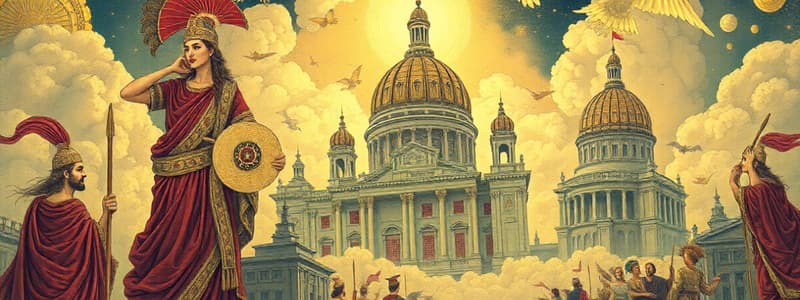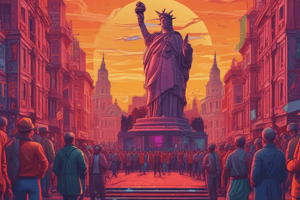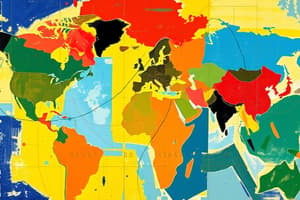Podcast
Questions and Answers
What are push factors?
What are push factors?
Conditions that drive people to leave their homeland. Example: War or famine.
Who is an immigrant?
Who is an immigrant?
A person who moves to a new country to settle permanently.
Who is a refugee?
Who is a refugee?
A person forced to leave their home due to war, persecution, or natural disaster.
What is a Colonial Government?
What is a Colonial Government?
What is a Democracy?
What is a Democracy?
What is a Republic?
What is a Republic?
Who are Reformers?
Who are Reformers?
What is Tyranny of the Majority?
What is Tyranny of the Majority?
What is Responsible Government?
What is Responsible Government?
What is Cholera?
What is Cholera?
What is an Epidemic?
What is an Epidemic?
What is Quarantine?
What is Quarantine?
What is a Royal Commission?
What is a Royal Commission?
What does it mean to Assimilate?
What does it mean to Assimilate?
What is a Coalition?
What is a Coalition?
What is Amnesty?
What is Amnesty?
What is the Family Compact?
What is the Family Compact?
What is the Château Clique?
What is the Château Clique?
What was the Great Migration?
What was the Great Migration?
What were the push factors that caused people to leave Britain during the Great Migration?
What were the push factors that caused people to leave Britain during the Great Migration?
What were the pull factors that attracted people to the British North American colonies during the Great Migration?
What were the pull factors that attracted people to the British North American colonies during the Great Migration?
What challenges and pressures did the Great Migration create for those already living in British North America?
What challenges and pressures did the Great Migration create for those already living in British North America?
How was the Great Migration similar to the Loyalist migration?
How was the Great Migration similar to the Loyalist migration?
What was Grosse Île, and what purpose did it serve?
What was Grosse Île, and what purpose did it serve?
What were the conditions like for immigrants traveling to British North America?
What were the conditions like for immigrants traveling to British North America?
How did the Great Migration affect the identity of the colonies?
How did the Great Migration affect the identity of the colonies?
Define democracy and explain why people in British North America wanted a more democratic government.
Define democracy and explain why people in British North America wanted a more democratic government.
Contrast the systems of Colonial Government and Democratic Government in British North America.
Contrast the systems of Colonial Government and Democratic Government in British North America.
Summarize the opinions of Thomas Jefferson with regard to democracy:
Summarize the opinions of Thomas Jefferson with regard to democracy:
Summarize the opinions of John Stuart Mill with regard to democracy:
Summarize the opinions of John Stuart Mill with regard to democracy:
Summarize the opinions of Alexis de Tocqueville with regard to democracy:
Summarize the opinions of Alexis de Tocqueville with regard to democracy:
Define the phrase "tyranny of the majority" and what groups in Canada might have concerns about it?
Define the phrase "tyranny of the majority" and what groups in Canada might have concerns about it?
What was the relationship between demands for more democratic government and challenges of coexistence in British North America during the Rebellions of 1837 and 1838?
What was the relationship between demands for more democratic government and challenges of coexistence in British North America during the Rebellions of 1837 and 1838?
Describe the situation in Lower Canada during the Rebellions of 1837 and 1838.
Describe the situation in Lower Canada during the Rebellions of 1837 and 1838.
Who were the reformers in British North America during the Rebellions of 1837 and 1838?
Who were the reformers in British North America during the Rebellions of 1837 and 1838?
Who was Lord Durham and what was his role?
Who was Lord Durham and what was his role?
What were Lord Durham's recommendations?
What were Lord Durham's recommendations?
What was the Act of Union and how did it come about?
What was the Act of Union and how did it come about?
How did the Act of Union put pressure on the Canadiens to assimilate?
How did the Act of Union put pressure on the Canadiens to assimilate?
What was the Rebellion Losses Bill?
What was the Rebellion Losses Bill?
What role did LaFontaine and Baldwin play in the move towards responsible government?
What role did LaFontaine and Baldwin play in the move towards responsible government?
Flashcards
Push Factors
Push Factors
Conditions that drive people to leave their homeland (e.g., war, famine).
Pull Factors
Pull Factors
Conditions that attract people to a new place (e.g., economic opportunities, religious freedom).
Immigrant
Immigrant
A person who moves to a new country to settle permanently.
Emigrant
Emigrant
Signup and view all the flashcards
Quarantine
Quarantine
Signup and view all the flashcards
Assimilate
Assimilate
Signup and view all the flashcards
Family Compact
Family Compact
Signup and view all the flashcards
The Great Migration
The Great Migration
Signup and view all the flashcards
Grosse Île
Grosse Île
Signup and view all the flashcards
Tyranny of the Majority
Tyranny of the Majority
Signup and view all the flashcards
Signup and view all the flashcards
Study Notes
- Study notes for chapter 7
Key Terms Related to Migration
- Push Factors involve conditions that drive people to leave their homelands, for example, war or famine.
- Pull Factors are conditions that attract people to a new place, such as economic opportunities or religious freedom.
- Immigrant: A person who moves to a new country to settle permanently.
- Emigrant: A person who leaves their own country to settle in another.
- Refugee: A person forced to leave their home due to war, persecution, or natural disaster.
Key Terms Related to Government and Democracy
- Colonial Government is controlled by a ruling country, where decisions are made by appointed officials rather than elected representatives.
- Democracy: A system of government where the people have power, usually through elected representatives.
- Republic: A government where leaders are elected rather than ruled by a monarch.
- Reformers: People wanted to change the government and make it more democratic and fair.
- Tyranny of the Majority: When the majority makes decisions that harm or ignore the rights of the minority.
- Responsible Government: A type of government where elected officials have real power and answer to the people.
Key Terms Related to Public Health
- Cholera: A bacterial disease that causes diarrhea and dehydration, often spread through contaminated water.
- Epidemic: A widespread outbreak of a disease within a specific population or area.
- Quarantine: Isolation of individuals or groups in order to prevent the spread of disease.
Key Terms Related to the Act of Union
- Royal Commission: A team of experts appointed by the government to study a problem and suggest solutions.
- Assimilate: Process that involves adopting the culture and customs of another group, often by force or policy, effectively erasing the original culture.
- Coalition: The temporary alliance of political groups working together for a common goal.
- Amnesty: A government decision intended to forgive people for past offenses, often after a political dispute,
Influential Groups
- Family Compact: A small, elite group in Upper Canada that controlled the government and resisted democratic reforms.
- Château Clique: A similar group of English-speaking elites in Lower Canada who held power and made decisions that often ignored the needs of French Canadians.
The Great Migration (1815-1850)
- The Great Migration was a large immigration wave from Britain and Ireland to British North America between 1815 and 1850.
- Push Factors: People were driven to leave Britain because of poverty, unemployment after the Napoleonic Wars, overcrowding in cities, famine (especially in Ireland), political unrest, and lack of opportunities.
- Pull Factors: They were attracted to the British North American colonies by free/cheap land for farming, job opportunities, a chance to freely start a new life, and the British government encouraged settlement to strengthen its control.
- Challenges: Competition for land and jobs, cultural and language tensions, strain on resources, plus infrastructure for those already in British North America.
- Challenges: French Canadians in Lower Canada feared being outnumbered by English-speaking newcomers.
- Challenges: Cities struggled to provide housing, jobs, and sanitation for the growing population.
- Similarities to Loyalist Migration: Both groups moved to British North America in large numbers, changed the population, faced hardships.
- Grosse lle: A quarantine station near Quebec City, and was used to screen and isolate sick immigrants, especially during the cholera epidemics of the 1830s and 1840s.
- Conditions during travel: Many traveled in overcrowded and unsanitary ships known as "coffin ships" where disease spread easily, there were many deaths, and food and water was often scarce.
- The journey was long and difficult, especially for poor families.
- Impact on colonies' identity: The population became more diverse, strengthened British control, and created tensions between French and English speakers.
The Push for Democracy
- Define Democracy: Democracy is government by the people through elected representatives.
- People wanted more democracy because colonial governments were controlled by small, unelected elites and Reformers wanted responsible government.
- Colonial Government contrasted with Democratic Government: Power held by appointed officials versus elected representatives, with government being accountable to the people.
- Thomas Jefferson advocated for individual rights and a government that serves the people.
- John Stuart Mill thought democracy was important but warned that the majority should not take away the rights of minorities.
- Alexis de Tocqueville supported democracy but believed it needed a strong education system and responsible leaders.
- Tyranny of the majority: It happens when the majority makes decisions that harm or ignore the rights of minorities.
- Groups with Concerns: French Canadians feared English-speaking settlers would take away their rights.
- Groups with Concerns: Indigenous Peoples were worried their lands and cultures would be erased.
- Groups with Concerns: Religious minorities were concerned their beliefs would not be respected in a majority-led government.
The Rebellions of 1837 and 1838
- A Relationship Established: The demands for more democratic government were challenged in regards to living together peacefully in British North America.
- Lack of democracy made many colonists frustrated, as power was held by small, unelected elites.
- Reformers wanted elected representatives would have real power instead of appointed officials loyal to Britain.
- Tensions between English and French settlers coupled with land issues made coexistence difficult.
- The British government resisted major democratic changes, leading to armed uprisings.
- Lower Canada, where the French-speaking majority felt marginalized: They resented the English-speaking elite's economic and political dominance.
- Led by Louis-Joseph Papineau and the Parti Patriote: Reformers demanded responsible government and greater rights for French Canadians.
- Economic hardships, high taxes, and crop failures increased frustrations, and in 1837, tensions ended with an armed rebellion, but was suppressed by British troops.
- Upper Canada was controlled by the Family Compact, who were wealthy British elites, had power and resisted democratic reforms.
- Farmers and middle-class citizens were led by William Lyon Mackenzie: Wanted responsible government and greater representation.
- Economic struggles and land policies created dissatisfaction and in 1837, Mackenzie led an armed rebellion which was poorly organized and defeated in Toronto.
- Key Reformers: Louis-Joseph Papineau led the Parti Patriote in Lower Canada.
- Key Reformers: William Lyon Mackenzie was a radical reformer and newspaper publisher in Upper Canada.
- Key Reformers: Joseph Howe was pushing for responsible government in Nova Scotia, and was unlike Papineau and Mackenzie.
Britain's Response to the Rebellions
- Lord Durham was sent to British North America in 1838 to investigate the causes of the rebellions and suggest solutions, in order to prevent further uprisings.
- His report became a key document in shaping Canada's political future.
- Lord Durham's Recommendations: To unite Upper and Lower Canada as it was believed it would improve governance.
- Lord Durham's Recommendations: Responsible Government where elected representatives have true power.
- Lord Durham's Recommendations: Assimilation of the French Canadiens to adopt the English's culture and language.
- Act of Union (1841): It united Upper and Lower Canada into one Province of Canada with regions: Canada West and Canada East.
- The regions had government with an equal representatives from each despite population sizes.
- The Act of Union made English the official language of the government.
- The goal behind making it the official language was weaken French cutlure so Canadiens would adopt the British's customs, language and governance.
- Rebellion Losses Bill: A bill compensated people in Canada East whose property was damaged during the rebellions.
- The Rebellion Losses Bill was controversial because some believed former rebels would receive money.
- Lord Elgin signed the Rebellion Losses Bill indicating how responsible the government was.
- Rioters damaged the the Parliament building after the Rebellion Losses Bill.
- Lafontaine and Baldwin were both reformers who together established government and formed a political alliance between English and French-speaking reformers.
- Elgin allowed the right for elected representatives to control government marking government in Canada.
Studying That Suits You
Use AI to generate personalized quizzes and flashcards to suit your learning preferences.




